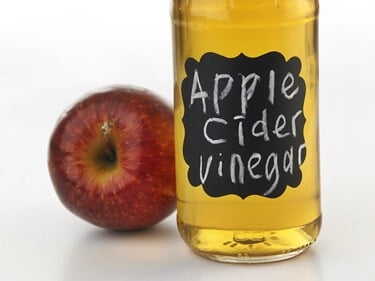Apple cider vinegar (ACV) is often thought of as a natural cure-all. In small, diluted doses, ACV is safe for healthy felines. However, there are certain caveats to the safety and efficacy of its consumption.
Apple cider vinegar is safe for healthy cats. Giving your cat 1-2 teaspoons of diluted apple cider vinegar can help with constipation, respiratory infections, urinary tract infections, and intestinal parasites. However, cats with underlying health conditions, such as kidney problems, should never consume apple cider vinegar.
While ACV has various health benefits, getting your cat to drink it can be challenging. It has a strong taste and scent that most cats find unpleasant. You shouldn’t force your cat to drink apple cider vinegar if it dislikes the taste.
Can Cats Drink Apple Cider Vinegar In Water?
Healthy cats can drink apple cider vinegar diluted in water. Just ensure that it’s in small amounts of about 1-2 teaspoons. This ratio will not cause any adverse effects.
Apple cider vinegar in water not only helps to cure respiratory and urinary tract infections. It can also ease constipation and kill parasites.
However, senior cats and those with renal failure should abstain from ACV. According to the Journal of Small Animal Practice, consuming apple cider vinegar can exacerbate the symptoms of feline renal failure.
Is Apple Cider Vinegar Good for Cats to Drink?
There are health benefits that cats can derive from drinking apple cider vinegar. These include:
Constipation
Apple cider vinegar is a natural laxative that can relieve constipation in cats. This drink contains pectin, a water-soluble fiber that speeds up the digestive process.
Constipation can be dangerous for cats. It can lead to intestinal blockage if the cat continues to feed as normal before the problem is resolved.
Fortunately, administering a small dose of ACV can clear out your cat’s gut. This will alleviate any digestive issues that it may be experiencing due to constipation.
To treat your cat’s constipation problem using apple cider vinegar, mix a teaspoon into your cat’s water. Let it settle for your cat to drink at its leisure. Once your cat is no longer constipated, check for signs of dehydration.
A sudden clearing of your cat’s gut may cause it to lose liquid. If you notice that your cat is dehydrated, encourage it to drink more water by replenishing its water bowl and leaving it in the open where it can easily access it.
Urinary Tract Infections
ACV is not only acidic but also has antibacterial properties that can cure urinary tract infections in cats. Normally, cats with UTIs will have hardened crystals inside their urethra.
If not removed promptly, these can harden into stones, thus making urination painful or impossible. Fortunately, the acidity in apple cider vinegar dissolves these crystals, allowing your cat to pass urine as normal.
Fungal Infections
ACV has also been proven to cure fungal infections in cats. If your cat is afflicted by skin fungus, dilute 1 teaspoon of apple cider vinegar in water. Apply it to the affected area.
Consuming apple cider vinegar can also get rid of internal yeast infections such as candida. This often attacks the cavities in cat teeth. Candida fungi feed on the sugars stuck in a cat’s mouth, thereby causing inflammation of the mouth and gums (stomatitis).
Although candida usually starts in the mouth, it can spread to other parts of the body. It will then increase the cat’s risk for diabetes and gum disease. A safe dose of apple cider vinegar can clear the infection.
Respiratory Infections
According to the Journal of Food Science, apple cider vinegar has antibacterial properties and can treat bacterial respiratory infections in cats. These include feline herpesvirus (FHV), bordetella bronchiseptica (B. bronchiseptica), and chlamydophyla felis (C. phelis).
Nevertheless, you should be aware that the use of apple cider vinegar to cure respiratory infections may also kill off bacteria that are vital for your cat’s gut health.
It’s important to not use it preventatively but only as treatment for an existing problem.

Parasites
ACV is an effective natural remedy for parasites, such as fleas and ticks. That’s because these parasites find the smell of ACV unpleasant. However, apple cider vinegar will not kill parasites. Rather, it will keep them off your cat.
Ticks and fleas will still be able to reproduce and may cause an infestation in your home. For this reason, you should not rely entirely on apple cider vinegar to get rid of parasites. Instead, you should use this remedy in conjunction with other parasite control methods to prevent infestation.
Nevertheless, ACV is effective when it comes to removing internal parasites. These include:
- Tapeworms
- Threadworms
- Roundworms
The acid kills intestinal parasites, which are then shed from the body through feces. Keep in mind that apple cider vinegar only kills intestinal worms once they have been established.
As such, having a worm prevention strategy is more impactful for safeguarding your cat’s health. This will spare your cat unwanted side effects and discomfort.
Ear Infections
ACV also works as a home remedy for ear infections in cats. Get a dropper, add ACV to it, and pour 2 drops of the liquid into each of your cat’s ears. This will get rid of any bacteria.
Itchy Skin
ACV is a popular treatment for itchy skin in cats. The best part is it doesn’t require your cat to drink it. Instead, the medication is applied as a topical treatment.
Most itchy skin conditions in cats arise due to a build-up of yeast over several years. Yeast doesn’t thrive in acidic conditions, which is why apple cider vinegar presents the perfect remedy. To treat your cat’s skin using ACV, add a few drops of the liquid to a cotton ball and dab on the afflicted area.
If your cat has developed sores and wounds on the skin due to scratching, it might flinch as you administer the treatment. However, the discomfort is only temporary, and your cat will be better off in the long run.
Can I Give My Cat Apple Cider Vinegar Daily?
Apple cider can be given to cats as a daily dose, as long as the dosage is maintained at a safe amount.
Drinking apple cider vinegar can be beneficial to your cat’s health. However, excessive amounts of ACV may lead to a buildup in acidity in your cat’s body. This might trigger kidney problems.
When ingested in non-diluted form, apple cider vinegar may also trigger vomiting and diarrhea. Some cats may also experience allergic reactions to apple cider vinegar and manifest symptoms such as rashes and itching.
You should observe how your cat responds to small doses of ACV. If it doesn’t react badly, or at all, you can increase the frequency of administration.
Will Apple Cider Vinegar Help My Cat’s UTI?
As mentioned, apple cider vinegar has acid and anti-bacterial properties that can help combat urinary tract infections in cats. Urinary tract infections are usually characterized by crystals inside the urethra. These often harden into stones, thus making urination painful or impossible for pet cats.
Administering apple cider vinegar dissolves the crystals. That alleviates any symptoms of urinary obstruction, enabling your cat to pass urine as normal.
Will Apple Cider Vinegar Kill Worms in Cats?
Apple cider vinegar has shown promising results when it comes to treating cats for worms.
Unlike other types of vinegar, apple cider works effectively as a remedy against worms. It increases the alkalinity levels in a cat’s intestines, thus rendering it inhospitable for these parasites. As a result, the worms inside the cat’s gut are neutralized and ejected from the pet’s body through feces.
If you suspect that tapeworms, roundworms, or threadworms afflict your cat, add a ½ teaspoon of ACV to their drinking water a few times a week. This will get rid of worms in your cat’s digestive tract.
Will Apple Cider Vinegar Kill Tapeworms in Cats?
As mentioned, ACV is an effective remedy against all kinds of worms in cats. The acidity in this drink kills intestinal worms, including tapeworms, which are then removed from the cat’s body via feces.
Administering 1 teaspoon of diluted ACV a few times a week will eliminate tapeworms inside your cat’s intestines. This ensures your cat’s digestive tract is healthy and parasite-free.
Can I Give My Cat Apple Cider Vinegar in a Syringe?
While ACV is usually given to cats orally by mixing with food or drinking water, it can also be administered using a syringe. This is often done to ailing cats that are unable to feed or drink.
To do this, mix ¼ teaspoon of apple cider vinegar with ¾ teaspoon of water. Draw up the mixture into a syringe and inject the solution inside your cat’s mouth.
Do Cats Like The Smell of Apple Cider Vinegar?
ACV has a strong scent that most cats find unpleasant. As such, getting your cat to drink an apple cider vinegar solution may be quite challenging at first.
Most felines also find the taste of apple cider vinegar off-putting and will reject it immediately. As such, administering apple cider vinegar to your cat requires some creativity on your part.
Getting a cat to drink apple cider vinegar is the easiest way of administering the medication. It allows the cat to consume it in a diluted form by mixing it with their drinking water. This reduces the potency of the scent and taste.
Here’s how to get your cat to drink apple cider vinegar:

First Day
Mix a ½ teaspoon of ACV with 1 cup of water and transfer the solution to your cat’s water bowl. Observe how your cat reacts to drinking this solution.
You may notice your cat shying away from the water bowl at first after taking a whiff of the solution. It should then return to drink as normal. On the first day, don’t provide an alternative source of water for your cat. This will encourage it to try the apple cider vinegar solution.
Second Day
Increase the amount of apple cider vinegar to one teaspoon per cup of water and observe your cat’s reaction. Only provide an alternative source of drinking water if your cat refuses to drink the solution on the first day.
Before that, you may dip one of its paws in the mixture. This will incentivize your pet to lick its paw, thus familiarizing itself with the flavor.
Third Day
By the third day, your cat should start getting used to the taste of apple cider vinegar. At this point, you can increase the dosage to 2 teaspoons per cup of water.
If you observe that your cat is drinking up the water, maintain the dosage indefinitely. Once the symptoms you are trying to treat fade, keep giving your cat the ACV solution for up to 5 days before halting treatment.
Apple Cider Vinegar to Water Ratio for Cats
Consuming high amounts of ACV can cause adverse symptoms. These include diarrhea and vomiting in cats. Furthermore, high levels of acidity can damage your cat’s internal organs. It is important to administer apple cider vinegar in the right dose and ratio.
When giving your cat the medication orally, you should mix 1-2 teaspoons of ACV per 1 cup of water. On the other hand, if you are using apple cider vinegar as a topical medicine for skin and ear infections, mix it with water in the ratio of 2:1. You can then spray it in the affected areas.

